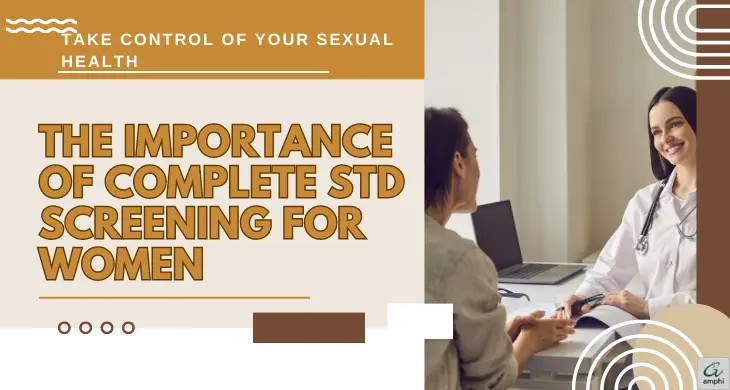Your sexual health is a crucial aspect of your overall well-being, and taking control of it is empowering. Complete STD screening plays a vital role in maintaining women’s sexual health, as it helps detect and prevent the spread of sexually transmitted diseases (STDs). In this article, we’ll explore the importance of complete STD screening for women, shedding light on common STDs, the significance of regular screening, and how it empowers you to make informed decisions about your sexual health. Get ready to take control and prioritize your sexual well-being!
- Understanding Common STDs: Provide an overview of common sexually transmitted diseases, including chlamydia, gonorrhea, human papillomavirus (HPV), herpes, syphilis, and HIV/AIDS. Explain how these infections are transmitted, their symptoms, potential complications, and the importance of early detection and treatment.
- The Importance of Complete STD Screening: Emphasize the significance of regular and complete STD screening for women. Discuss how comprehensive testing, including both laboratory tests and physical examinations, helps identify asymptomatic infections, ensures early detection, and prevents the spread of STDs. Explain that screening is not only for those with symptoms but also for those who are sexually active.
- Recommended STD Screening Guidelines: Provide an overview of recommended STD screening guidelines for women. Discuss the frequency of screening, age-specific recommendations, and considerations for high-risk populations. Highlight the importance of discussing screening options with a healthcare provider to tailor the testing schedule based on individual needs.
- Confidentiality and Privacy: Address concerns about confidentiality and privacy when it comes to STD screening. Explain the legal and ethical obligations of healthcare providers to protect patient information. Encourage open communication with healthcare professionals to address any privacy concerns and ensure a safe and confidential screening process.
- Partner Communication and Safe Sex Practices: Emphasize the significance of partner communication and practicing safe sex to prevent the transmission of STDs. Discuss the importance of discussing sexual health, using barrier methods (such as condoms), and considering mutual testing with sexual partners. Encourage open and honest conversations about sexual history and testing.
- Resources for STD Testing and Counseling: Provide information about available resources for STD testing and counseling. Discuss healthcare providers, clinics, and community organizations that offer confidential and accessible testing services. Include information about hotlines, online resources, and support groups that can provide additional guidance and support.
FAQS:

Ques: What is STD screening?
Ans: STD screening involves tests and examinations to detect sexually transmitted diseases (STDs). It typically includes laboratory tests to check for the presence of specific infections and may involve physical examinations or discussions about sexual history. Screening helps identify asymptomatic infections and ensures early detection and treatment.
Ques: Why is complete STD screening important for women?
Ans: Complete STD screening is crucial for women’s sexual health because many STDs can be asymptomatic, meaning they show no noticeable symptoms. Regular screening helps detect infections early, preventing complications and the spread of STDs to sexual partners. It empowers women to take control of their sexual health and make informed decisions.
Ques: How often should women undergo STD screening?
Ans: The frequency of STD screening depends on various factors, including sexual activity, age, and risk factors. Generally, it’s recommended for sexually active women to undergo annual screenings or as recommended by their healthcare provider. Certain high-risk populations, such as those with multiple partners or a history of STDs, may require more frequent screening.
Ques: What are some common STDs that women should be screened for?
Ans: Common STDs that women should be screened for include chlamydia, gonorrhea, human papillomavirus (HPV), herpes, syphilis, and HIV/AIDS. These infections can have serious health consequences if left untreated, but early detection through screening allows for timely intervention and treatment.
Ques: Will my STD screening results be confidential?
Ans: Yes, STD screening results are typically confidential. Healthcare providers have legal and ethical obligations to protect patient information and maintain confidentiality. It’s important to discuss any concerns about privacy with your healthcare provider to ensure a safe and confidential screening process.
Ques: How can I discuss STD testing with my partner?
Ans: Open and honest communication is key when discussing STD testing with your partner. Approach the conversation with empathy and respect, emphasizing that testing is about taking care of each other’s health. Discuss the importance of mutual testing and practicing safe sex together. If needed, involve healthcare professionals or utilize online resources to provide information and support during the discussion.
Ques: Where can I get STD testing and counseling?
Ans: STD testing and counseling services are available at various healthcare providers, clinics, and community organizations. Your primary care physician, gynecologist, or local sexual health clinics can offer screening services. Additionally, hotlines, online resources, and support groups can provide information, guidance, and additional resources for STD testing and counseling.
Conclusion:
Taking control of your sexual health starts with prioritizing complete STD screening. By understanding common STDs, getting regular screenings, practicing safe sex, and engaging in open communication with healthcare providers and partners, you can empower yourself to make informed decisions about your sexual well-being. Remember, complete STD screening is not only about your health but also about protecting yourself and others. Take the first step toward a healthier and more empowered sexual life by prioritizing complete STD screening today. Remember, complete STD screening is a proactive step towards maintaining your sexual health and protecting yourself and your sexual partners. By getting screened regularly, practicing safe sex, and engaging in open communication, you can take control of your sexual well-being and make informed decisions for a healthier future.

